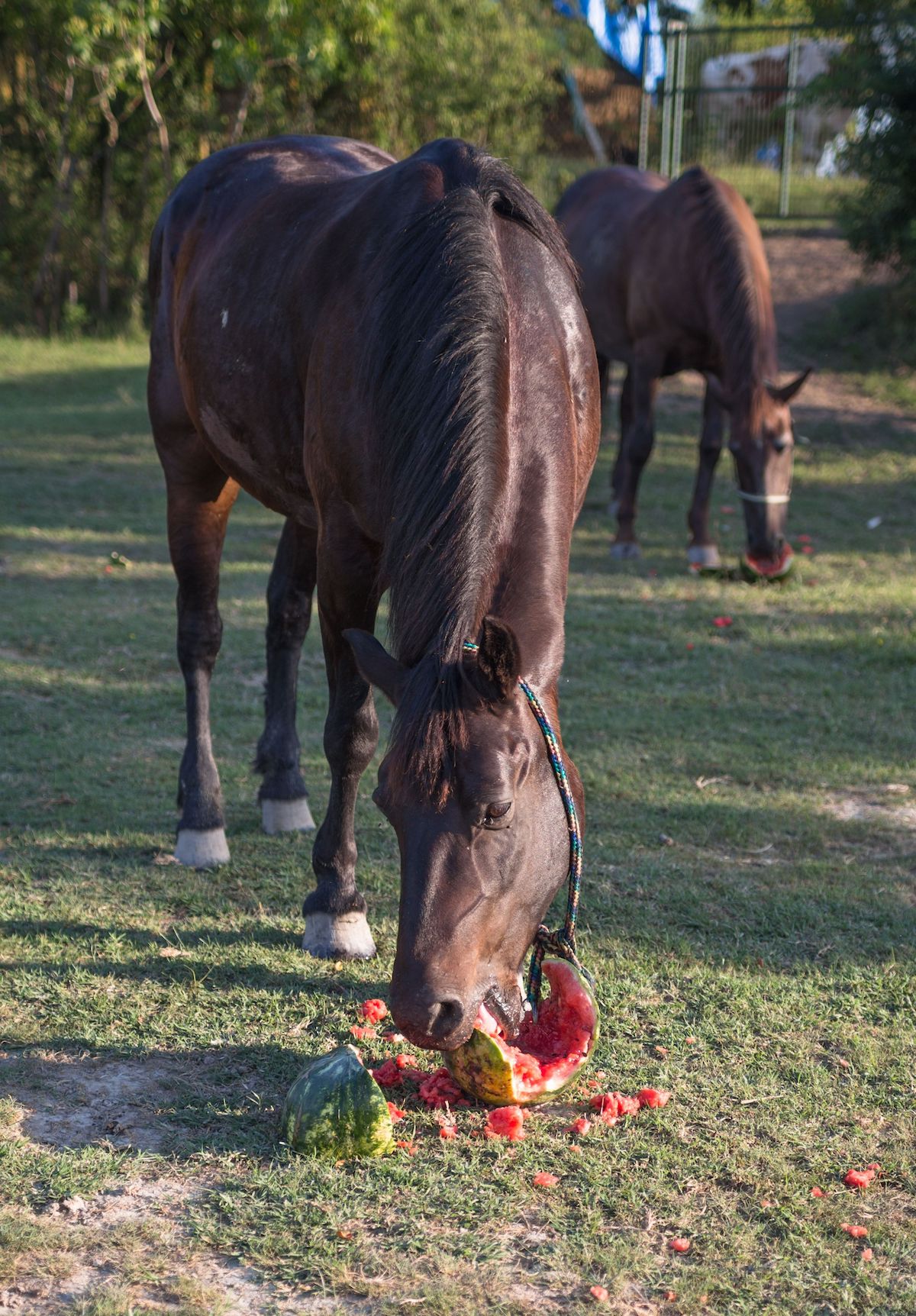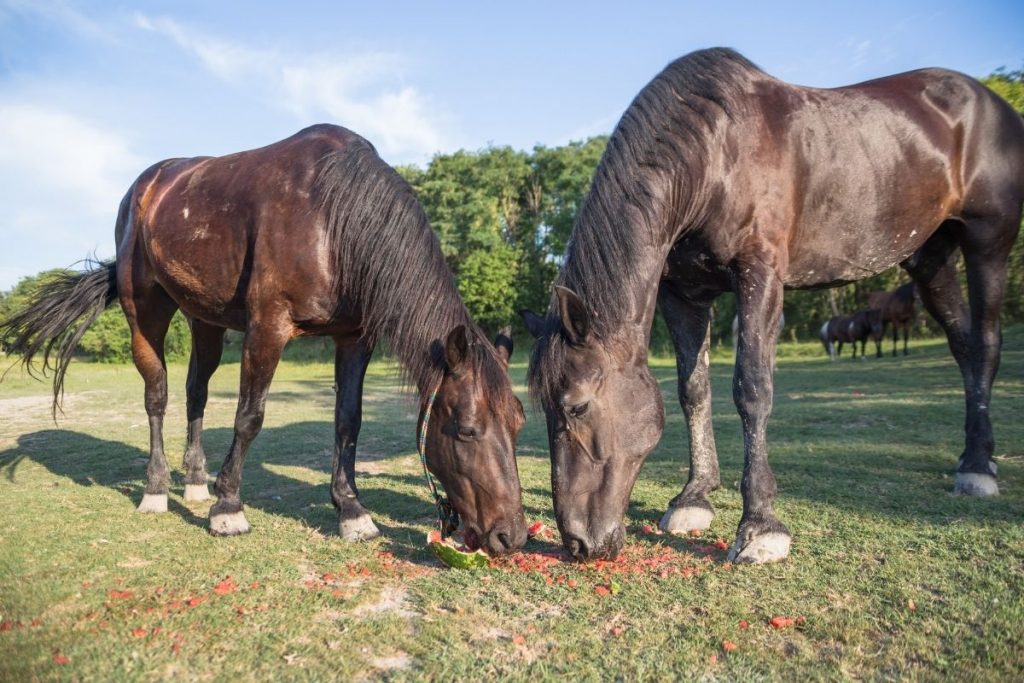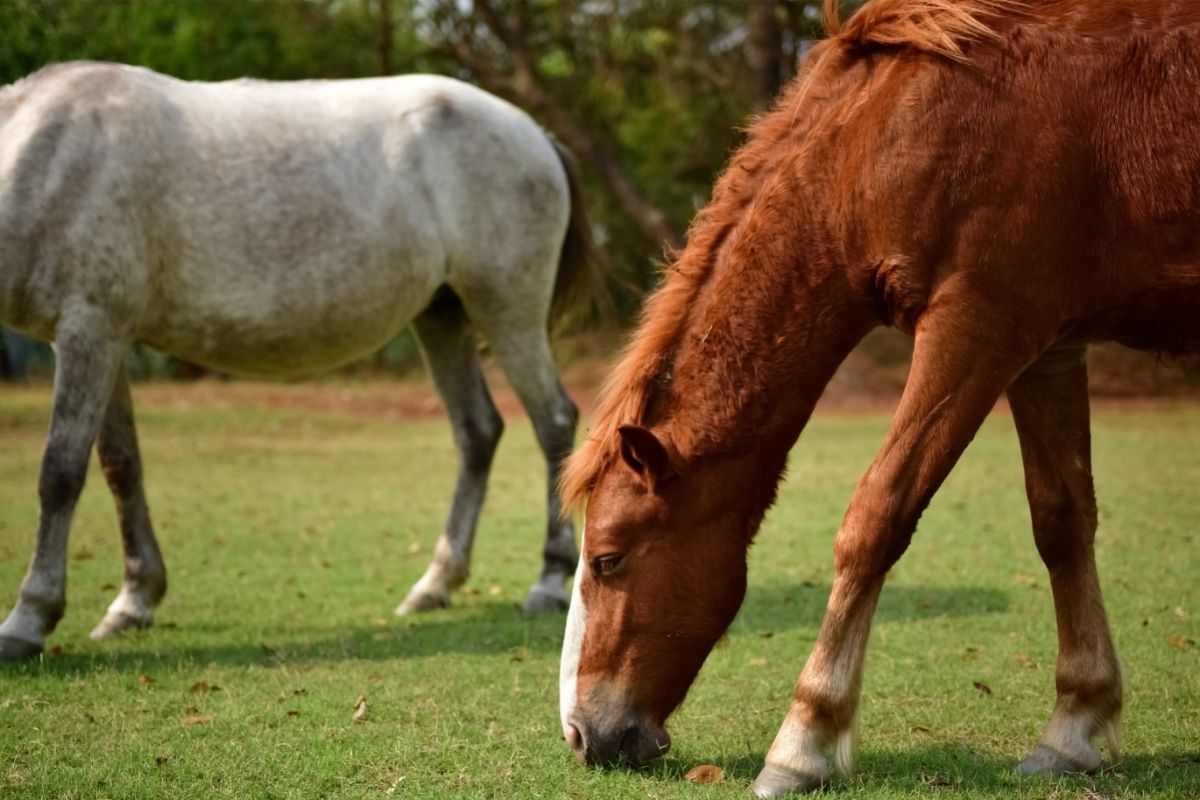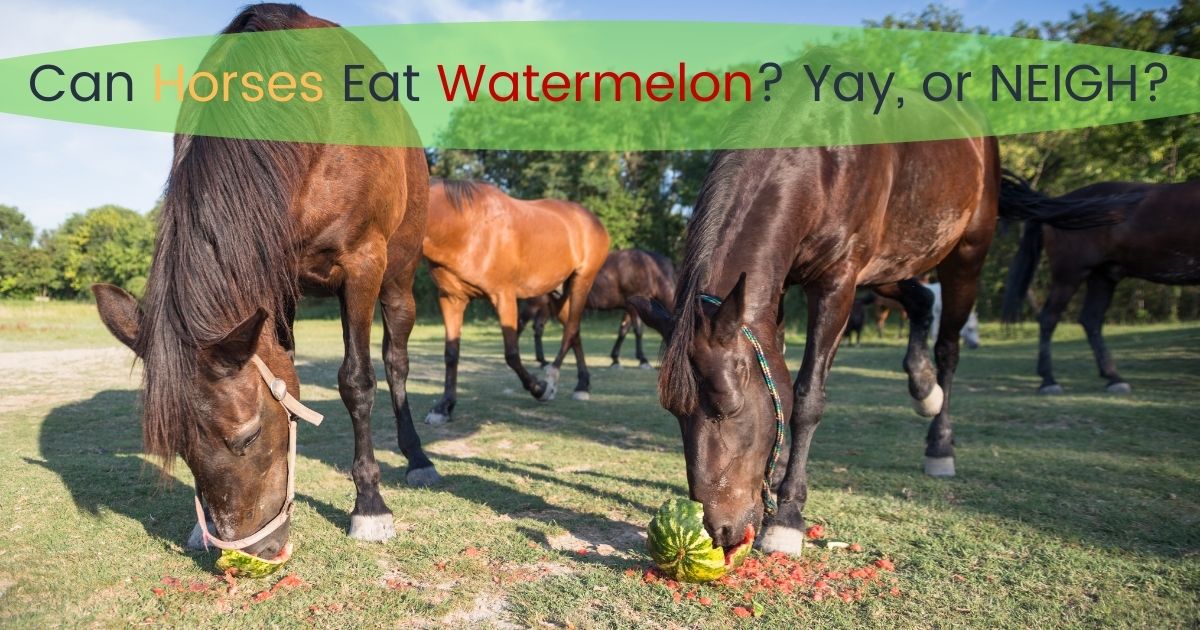Do Horses Eat Watermelon?
Imagine this; it is a hot summer’s day; you are out in the paddock with your horse eating a big slice of juicy watermelon. The thought crosses your mind, can horses eat watermelon, and would they enjoy it as much as I do?
The good news is, yes, horses can eat watermelon. Watermelon and the rinds of watermelons are a healthy treat full of beneficial vitamins and amino acids. However, it’s important to note that watermelon should only be a treat, and as with any treat, it’s fine as long as it’s enjoyed in moderation and as part of a balanced diet.
While the rind of a watermelon is generally not all that appealing to us, most horses love the taste and texture. Watermelon, both the fruit and the rind, are safe for horses to consume in small quantities. Some horses may not be so keen on watermelon, and others will be wild about it.
Allowing your horses to eat the rind is also a good way to reduce food waste in your household, as you’re using the entirety of the fruit!
Is Watermelon Good for Horses?
Watermelon is a refreshing treat that is enjoyed around the globe, and horses can enjoy it just as much as we do! Watermelon is extremely hydrating and is full of vitamins and minerals.
Watermelon is full of potassium, which is required for a horse’s physiological well-being. Horses also get potassium from forage, hay, and grass. The rind of a watermelon can also provide potassium.
Horses lose high amounts of potassium through their sweat and urine. Therefore, when a horse sweats excessively and is fed a low forage diet, it is at risk of suffering from a potassium deficiency. This can result in serious physical ailments. Horses are at a higher risk of this during the warmer months, coincidentally when watermelon is at its best.
Some common signs of potassium deficiency include muscle weakness, fatigue, decreased appetite, and an intolerance to exercise. Thankfully, the best remedy for horses with low potassium is access to fresh grass, electrolyte supplements, and watermelon rinds!
Since watermelon has a different flavor and texture to most common horse feed, it’s a good way to help mix up a horses’ diet, especially if they’re being fussy with their usual food.

Can Horses Eat Watermelon?
Watermelon can be a tasty, healthy treat for horses when given in small quantities and as part of a balanced diet.
Horses can eat all parts of a watermelon, including the flesh, seeds, and rind. Some horses may not enjoy watermelon, and horses are just like humans; they will like some food and dislike others. It’s good practice to respect horses’ tastes.
Fruit Sugar Information in Watermelons
One of the typical concerns with feeding watermelon to horses is the seemingly high sugar content. As the name suggests, watermelon consists mostly of water. A serving of watermelon is 90% water and only 10% sugar.
A cup of diced watermelon contains 0.01 ounces (0.38 g) of fiber and 0.3 ounces (11.34 g) of sugar. There is also a wide range of essential vitamins and minerals such as vitamins A and C, magnesium, and phosphorus.
Sugar occurs naturally in all fruits and vegetables. This is inclusive of carrots, an all-time favorite horse treat. Carrots contain about 0.2 ounces (7.56 g) of sugar per cup diced. Pasture grass can also be sugar dense depending on the time of year. The amount of sugar in the grass can be more than 25%.
A horse’s sugar intake over the course of a day can easily be several pounds. Therefore, a small amount of watermelon incorporated into their daily intake should not be a worry.
However, too much sugar can lead to laminitis and colic. Therefore, it is always important to be aware of their daily diet and what that entails. Read our article and find out if horses can eat apples.
Watermelon Toxins
Another concern about feeding watermelon to horses is the potential for toxins in the rind. Thankfully, watermelons belong to the same family as cucumbers. Due to their familial similarities, there are no hidden toxins in watermelon skin or rinds dangerous to horses. People often pickle the watermelon rind as a treat for themselves!
It is essential to wash the outside of a watermelon before serving it up to your horse, or anyone for that matter. During the growing and harvesting stages, the entirety of the watermelon crop may be sprayed with pesticides or herbicides to ensure that the fruit grows properly. Unfortunately, the outside of watermelon can also be a carrier of bacteria, such as E. coli.
These herbicides and pesticides are best to avoid for both you and your horses. If consumed, they can cause gastrointestinal upsets. Despite this being a worst-case scenario, you should always wash the outside of the rind with cool water and a scrub brush. Do this before cutting into the melon; otherwise, the flesh of the melon could become contaminated.
Watermelon seeds can also be a cause for concern among some owners. However, the quantity of toxins in watermelon seeds is so minute it is unlikely to cause any problems if eaten in moderation. In addition, since watermelon seeds are so tiny, they will not be a choking hazard for horses, who have a much wider throat than humans.
If you’re still worried, then going with a seedless watermelon or removing the seeds yourself would be the way to go.
Can Horses Eat Watermelon Rinds?
As mentioned early in the article, horses can eat watermelon rinds. They provide a wide variety of beneficial vitamins and amino acids. The watermelon rind is the outer cover of the melon and includes the white portion of the melon. This is between the pink flesh and green skin. It protects the pink, sweet flesh from any outside harm.
Of course, always wash the watermelon outside with water before cutting. This will remove any nasty stuff the watermelon has come into contact with throughout its journey from a single seed to your table.
Horses love crunching through watermelon rinds, but cutting them into small pieces is essential to avoid the rind becoming a choking hazard. As with any treat, moderation is key to ensuring no gastrointestinal upsets occur.

The Benefits of a Horse Eating a Watermelon Rind
There is a multitude of benefits that horses receive from eating watermelon rind. Watermelon rinds are a rich source of fiber, potassium, and amino acids. In addition, they provide vitamins A, B6, and C.
Horses can get lots of fiber from watermelon rinds. As a general rule, a horse’s daily diet should consist of approximately fifty percent fiber. Horses typically get fiber from rough forage such as hay and grass. Paddock horses do well on a fiber-only diet when not being worked.
Fiber is essential to a horse’s gastrointestinal health. Fiber is converted into energy through a fermentation process. The microflora in a horses’ gut converts fiber into volatile fatty acids that the horse absorbs. This is their primary source of daily energy. In addition, energy from the fiber is used for a horse’s ordinary body functions like breathing, walking, grazing, and sleeping.
Horses in work perform better with a supplement of grain feed. This provides fat and sugar, which are quickly converted into energy for strenuous exercise.
Fiber is critical for a typical horse’s well-being. Without fiber, digestion is slowed down, and this can cause dehydration, colic, and laminitis.
Horses also receive a healthy bump in their amino acid consumption from watermelon rinds. In particular, watermelon rinds provide the amino acid citrulline. Citrulline converts to arginine in the horse’s body. Arginine produces nitric oxide, which is what relaxes blood vessels and increases blood flow to particular areas.
Arginine is also credited with lowering blood pressure, improving vascular health, combating fatigue, stimulating the immune system, fighting cancer, and helping muscle growth and wound healing.
How Much Watermelon Rind Can a Horse Have?
Similarly to any treat, watermelon rinds should not make up more than ten percent of a horse’s daily intake. Ideally, a horse should not get more than two cups of watermelon rind per day.
When feeding watermelon rind, cut the rind into small cubes. The small pieces are less likely to get lodged in a horse’s throat and cause a foreign body obstruction. Cutting the rind into small pieces also makes for easy storage if you plan on keeping lots of watermelon rinds on hand.

Interesting Facts on Watermelons
As the months get warmer and watermelons come into their best months, here are some fun facts about watermelons.
The scientific name for watermelon is Citrullus Lantus. Additionally, watermelons are a part of the Cucurbitaceae family, which is the same botanical family as cucumbers, pumpkins, and squash. The watermelon is assumed to be from Asia or Africa initially, but since it can grow in various climates, it has made its way worldwide.
Watermelons can take approximately three months to grow. The internal cracks in the flesh of watermelons are called “Hollow Hearts,” and these watermelons are often the sweetest.
Seedless watermelons have been around since the early 1970s.
Watermelons are a fantastic, healthy treat. They are fat-free and have zero cholesterol. They are over 90 percent water and only 50 calories per cup.
The Final Neigh!
Watermelon is a sweet, tasty treat that you can share with your equine friend. It contains plenty of beneficial vitamins, minerals, and amino acids.
Always be sure to wash the outside of the watermelon before cutting. This will help to remove any harmful pesticides, herbicides, and bacteria.
As with any treat, moderation is key. Feeding less than two cups of watermelon and the rind is safe for horses. The watermelon should be cut into small, easy-to-chew pieces.
There is no reason your horse cannot enjoy this summertime treat, just as we do. But remember, no matter what kind of food it is, it’s always best had as part of a balanced diet!
